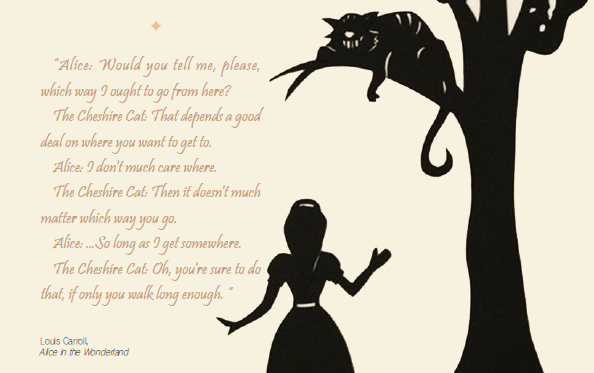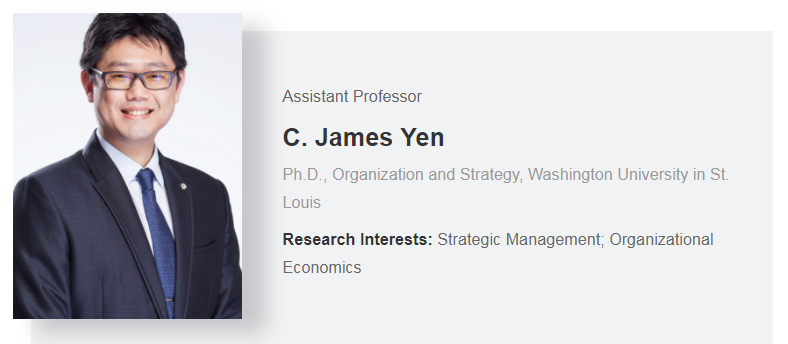After Alice fell into the rabbit hole and had the magical experience of getting bigger and smaller, she got lost. In fact, it is not precise to say that she was lost, because she had never been to this place before. Consequently, she had no idea where she wanted to go and thus did not know which way to go. So when Alice came across a smiling cat that popped up in a tree, there's the classic conversation above. A classic indeed, but what's the insight within the conversation?

I guess you might say that the conversation between Alice and the Cat points out an obvious proposition: You must decide where you want to go—that is, your goal or ends—before you decide which way you should go—that is, your means. If you don't have any specific goal in mind, then you cannot assess whether a means is appropriate or not because there is no basis for you to choose among alternatives. If you do find the proposition obvious, that is because we all received the same scientific training called rational thinking: Set the goal first, and next decide your means; or define your problem first before you choose among alternative solutions. If there is no destination—and hence you do not know where you want to go—then it does not matter which way you go, as suggested by the Cheshire Cat.
But wait; please put yourself in the shoes of Alice and think about the situation she faced. If you were Alice, what kind of situation would you be in now? Falling into a rabbit hole, you found a wonderland, a new world that "no one has ever been in before." Since you have never been here before, do you know where you want to go and which way you should go? Do you have a destination or a goal in this new world? Furthermore, we should probably ask: Is it meaningful to even talk about "destination" or pre-determined goal?
Where Should Alice Go?
If you agree that it is meaningless to talk about destination or goal in a place where "no one has ever been before," we can now reconsider the question: What should Alice do? "Straightforward," you may say, "just hurry up and find a goal, and then she can move forward!" If this is your answer, rational thinking must be so deep-rooted in your way of thinking that you've immediately forgotten what we have just agreed upon: In a place where "no one has ever been before," it is meaningless to talk about destination and goal.
We are so accustomed to adopt rational thinking—we must first have a goal or destination before we choose a means or pathway—that we forget sometimes in the journey of life we are in a place where no one has been before. It means that you cannot pre-determine your destination before you start your journey, and it is more important that you start going somewhere than determining your destination and choosing the way to go there. It is a situation where adopting rational analysis is ineffectual. Moreover, it is a situation where effectual thinking—an opposite way of rational thinking, that is, first to determine the means and next to find the ends—is most effective.
Effectual thinking is especially useful in places where "no one has ever been before." In such a place, there is no map and neither a pre-determined destination. So, when exploring uncharted places, the emphasis is not on "defining the destination of your journey" but on "finding possible ways for you to keep going (i.e., means)." And "if only you walk long enough, you're sure to get somewhere (i.e., ends)." The destination is not pre-determined but will emerge along the way.
Entrepreneurs in start-ups and innovators in established companies spend most of their time exploring places where no one has ever been before: new markets, new technology, or a combination of both. They often find that when dealing with unknown, brand new markets and industries, if you set up a goal in advance and stick to it with a series of rational planning, the outcome is almost always far from the initial forecast and expectation. However, effectual thinking oftentimes dominates entrepreneurs’ and innovators’ decision making process and is helpful to keep them going until they create meaningful goals and ends—that is, new markets or technology.
No wonder Alice would say, "I don't much care where . . . as long as I get somewhere." Now that she's in the wonderland, Alice won't be willing to stay where she is. The new world is so interesting, how can she not explore it? If Alice were the one who would like to go somewhere with a map and destination, she would not have chased the rabbit and fallen into the rabbit hole. So, was Alice lost or was she busy exploring the brave new world? What do you think?

Published on PHBS Magazine Spring 2020 (Read More)
















